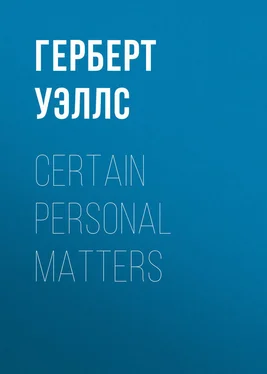Герберт Уэллс - Certain Personal Matters
Здесь есть возможность читать онлайн «Герберт Уэллс - Certain Personal Matters» — ознакомительный отрывок электронной книги совершенно бесплатно, а после прочтения отрывка купить полную версию. В некоторых случаях можно слушать аудио, скачать через торрент в формате fb2 и присутствует краткое содержание. Жанр: foreign_antique, foreign_prose, на английском языке. Описание произведения, (предисловие) а так же отзывы посетителей доступны на портале библиотеки ЛибКат.
- Название:Certain Personal Matters
- Автор:
- Жанр:
- Год:неизвестен
- ISBN:нет данных
- Рейтинг книги:3 / 5. Голосов: 1
-
Избранное:Добавить в избранное
- Отзывы:
-
Ваша оценка:
- 60
- 1
- 2
- 3
- 4
- 5
Certain Personal Matters: краткое содержание, описание и аннотация
Предлагаем к чтению аннотацию, описание, краткое содержание или предисловие (зависит от того, что написал сам автор книги «Certain Personal Matters»). Если вы не нашли необходимую информацию о книге — напишите в комментариях, мы постараемся отыскать её.
Certain Personal Matters — читать онлайн ознакомительный отрывок
Ниже представлен текст книги, разбитый по страницам. Система сохранения места последней прочитанной страницы, позволяет с удобством читать онлайн бесплатно книгу «Certain Personal Matters», без необходимости каждый раз заново искать на чём Вы остановились. Поставьте закладку, и сможете в любой момент перейти на страницу, на которой закончили чтение.
Интервал:
Закладка:
I have observed that there is even nowadays a certain advance towards my views in this matter. Men may not pick out antagonists, and argue to the general audience as once they did: there is a tacit taboo of controversy, neither may you talk your "shop," nor invite your antagonist to talk his. There is also a growing feeling against extensive quotations or paraphrases from the newspapers. Again, personalities, scandal, are, at least in theory, excluded. This narrows the scope down to the "last new book," "the last new play," "impressions de voyage," and even here it is felt that any very ironical or satirical remarks, anything unusual, in fact, may disconcert your adversary. You ask: Have you read the Wheels of Chance ? The answer is "Yes." "Do you like it?" "A little vulgar, I thought." And so forth. Most of this is stereo. It is akin to responses in church, a prescription, a formula. And, following out this line of thought, I have had a vision of the twentieth century dinner. At a distance it is very like the nineteenth century type; the same bright light, the same pleasant deglutition, the same hum of conversation; but, approaching, you discover each diner has a little drum-shaped body under his chin – his phonograph. So he dines and babbles at his ease. In the smoking-room he substitutes his anecdote record. I imagine, too, the suburban hostess meeting the new maiden: "I hope, dear, you have brought a lot of conversation," just as now she asks for the music. For my own part, I must confess I find this dinner conversation particularly a bother. If I could eat with my eye it would be different.
I lose a lot of friends through this conversational difficulty. They think it is my dulness or my temper, when really it is only my refined mind, my subtlety of consideration. It seems to me that when I go to see a man, I go to see him – to enjoy his presence. If he is my friend, the sight of him healthy and happy is enough for me. I don't want him to keep his vocal cords, and I don't want to keep my own vocal cords, in incessant vibration all the time I am in his company. If I go to see a man, it distracts me to have to talk and it distracts me to hear him talking. I can't imagine why one should not go and sit about in people's rooms, without bothering them and without their bothering you to say all these stereotyped things. Quietly go in, sit down, look at your man until you have seen him enough, and then go. Why not?
Let me once more insist that this keeping up a conversation is a sign of insecurity, of want of confidence. All those who have had real friends know that when the friendship is assured the gabble ceases. You are not at the heart of your friend, if either of you cannot go off comfortably to sleep in the other's presence. Speech was given us to make known our needs, and for imprecation, expostulation, and entreaty. This pitiful necessity we are under, upon social occasions, to say something – however inconsequent – is, I am assured, the very degradation of speech.
IN A LITERARY HOUSEHOLD
In the literary household of fiction and the drama, things are usually in a distressing enough condition. The husband, as you know, has a hacking cough, and the wife a dying baby, and they write in the intervals of these cares among the litter of the breakfast things. Occasionally a comic, but sympathetic, servant brings in an armful – "heaped up and brimming over" – of rejected MSS., for, in the dramatic life, it never rains but it pours. Instead of talking about editors in a bright and vigorous fashion, as the recipients of rejections are wont, the husband groans and covers his face with his hands, and the wife, leaving the touching little story she is writing – she posts this about 9 p.m., and it brings in a publisher and £100 or so before 10.30 – comforts him by flopping suddenly over his shoulder. "Courage," she says, stroking his hyacinthine locks (whereas all real literary men are more or less grey or bald). Sometimes, as in Our Flat , comic tradesmen interrupt the course of true literature with their ignoble desire for cash payment, and sometimes, as in Our Boys , uncles come and weep at the infinite pathos of a bad breakfast egg. But it's always a very sordid, dusty, lump-in-your-throaty affair, and no doubt it conduces to mortality by deterring the young and impressionable from literary vices. As for its truth, that is another matter altogether.
Yet it must not be really imagined that a literary household is just like any other. There is the brass paper-fastener, for instance. I have sometimes thought that Euphemia married me with an eye to these conveniences. She has two in her grey gloves, and one (with the head inked) in her boot in the place of a button. Others I suspect her of. Then she fastened the lamp shade together with them, and tried one day to introduce them instead of pearl buttons as efficient anchorage for cuffs and collars. And she made a new handle for the little drawer under the inkstand with one. Indeed, the literary household is held together, so to speak, by paper-fasteners, and how other people get along without them we are at a loss to imagine.
And another point, almost equally important, is that the husband is generally messing about at home. That is, indeed, to a superficial observer, one of the most remarkable characteristics of the literary household. Other husbands are cast out in the morning to raven for income and return to a home that is swept and garnished towards the end of the day; but the literary husband is ever in possession. His work must not be disturbed even when he is merely thinking. The study is consequently a kind of domestic cordite factory, and you are never certain when it may explode. The concussion of a dust-pan and brush may set it going, the sweeping of a carpet in the room upstairs. Then behold a haggard, brain-weary man, fierce and dishevelled, and full of shattered masterpiece – expostulating. Other houses have their day of cleaning out this room, and their day for cleaning out that; but in the literary household there is one uniform date for all such functions, and that is "to-morrow." So that Mrs. Mergles makes her purifying raids with her heart in her mouth, and has acquired a way of leaving the pail and brush, or whatever artillery she has with her, in a manner that unavoidably engages the infuriated brute's attention and so covers her retreat.
It is a problem that has never been probably solved, this discord of order and orderly literary work. Possibly it might be done by making the literary person live elsewhere or preventing literary persons from having households. However it might be done, it is not done. This is a thing innocent girls exposed to the surreptitious proposals of literary men do not understand. They think it will be very fine to have photographs of themselves and their "cosy nooks" published in magazines, to illustrate the man's interviews, and the full horror of having this feral creature always about the house, and scarcely ever being able to do any little thing without his knowing it, is not brought properly home to them until escape is impossible.
And then there is the taint of "copy" everywhere. That is really the fundamental distinction. It is the misfortune of literary people, that they have to write about something. There is no reason, of course, why they should, but the thing is so. Consequently, they are always looking about them for something to write about. They cannot take a pure-minded interest in anything in earth or heaven. Their servant is no servant, but a character; their cat is a possible reservoir of humorous observation; they look out of window and see men as columns walking. Even the sanctity of their own hearts, their self-respect, their most private emotions are disregarded. The wife is infected with the taint. Her private opinion of her husband she makes into a short story – forgets its origin and shows it him with pride – while the husband decants his heart-beats into occasional verse and minor poetry. It is amazing what a lot of latter-day literature consists of such breaches of confidence. And not simply latter-day literature.
Читать дальшеИнтервал:
Закладка:
Похожие книги на «Certain Personal Matters»
Представляем Вашему вниманию похожие книги на «Certain Personal Matters» списком для выбора. Мы отобрали схожую по названию и смыслу литературу в надежде предоставить читателям больше вариантов отыскать новые, интересные, ещё непрочитанные произведения.
Обсуждение, отзывы о книге «Certain Personal Matters» и просто собственные мнения читателей. Оставьте ваши комментарии, напишите, что Вы думаете о произведении, его смысле или главных героях. Укажите что конкретно понравилось, а что нет, и почему Вы так считаете.








